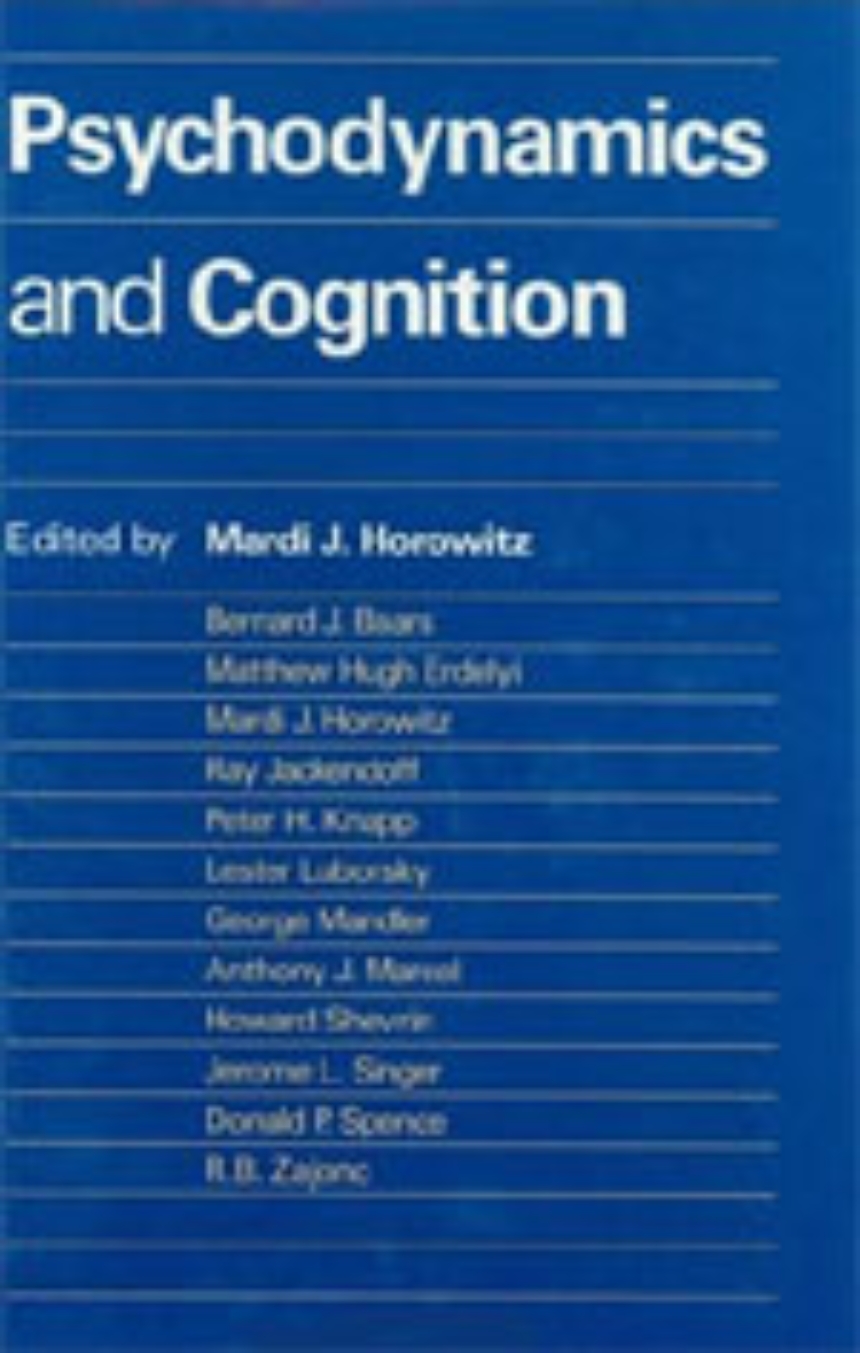Psychodynamics and Cognition
Psychodynamics and Cognition outlines ways that methods and ideas from cognitive and information science can be used to reformulate psychoanalytic concepts and to test them outside the psychoanalytic situation. Based on a 1984 conference sponsored by the Health Program of the John D. and Catherine T. MacArthur Foundation, this book presents a series of papers by distinguished scholars in psychoanalysis, cognitive psychology, neuroscience, and linguistics.
408 pages | 38 line drawings | 6.00 x 9.00 | © 1988
The John D. and Catherine T. MacArthur Foundation Series on Mental Health and Development
Cognitive Science: Human and Animal Cognition
Table of Contents
Preface
Contributors
Part 1. Consciousness and Unconscious Formative Processes
1. Psychodynamic Phenomena and Their Explanation
Mardi J. Horowitz, M.D.
2. Problems and Directions in the Study of Consciousness
George Mandler, Ph.D.
Part 2. A Clinical Psychodynamic Perspective
3. Unconsciously Determined Defensive Strategies
Mardi J. Horowitz, M.D.
4. Issues in the Study of Unconscious and Defense Processes: Discussion of Horowitz’s Comments, with Some Elaborations
Matthew Hugh Erdelyi, Ph.D.
5. Steps Toward a Lexicon: Discussion of "Unconsciously Determined Defensive Strategies"
Peter H. Knapp, M.D.
Part 3. An Experimental Psychodynamic Perspective
6. Unconscious Conflict: A Convergent Psychodynamic and Electrophysiological Approach
Howard Shevrin, Ph.D.
7. Electrophysiology and Meaning in Cognitive Science and Dynamic Psychology—Comments on "Unconscious Conflict: A Convergent Psychodynamic and Electrophysiological Approach"
Anthony J. Marcel, Ph.D.
8. A Response to Marcel’s Discussion
Howard Shevrin, Ph.D.
9. Exploring the Form of Information in the Dynamic Unconscious
Ray Jackendoff, Ph.D.
Part 4. Omissions of the Expectable from Consciousness
10. Recurrent Momentary Forgetting: Its Content and Its Context
Lester Luborsky, Ph.D.
11. Momentary Forgetting: An Alternative Formulation
Donald P. Spence, Ph.D.
12. Take a Moment to Really Look at the Little Lawful World of Momentary Forgetting—A Reply to Spence
Lester Luborsky, Ph.D.
13. Momentary Forgetting as a "Resetting" of a Conscious Global Workspace Due to Competition between Incompatible Contexts
Bernard J. Baars, Ph.D.
Part 5. Understanding Conscious Experience
14. Sampling Ongoing Consciousness and Emotional Experience: Implications for Health
Jerome L. Singer, Ph.D.
15. Prolegomena for the Study of Access to Mental Events: Notes on Singer’s Chapter
R. B. Zajonc, Ph.D.
Part 6. Conclusions
16. Agreements and Disagreements: Indications for Research
Mardi J. Horowitz, M.D.
Author Index
Subject Index
Contributors
Part 1. Consciousness and Unconscious Formative Processes
1. Psychodynamic Phenomena and Their Explanation
Mardi J. Horowitz, M.D.
2. Problems and Directions in the Study of Consciousness
George Mandler, Ph.D.
Part 2. A Clinical Psychodynamic Perspective
3. Unconsciously Determined Defensive Strategies
Mardi J. Horowitz, M.D.
4. Issues in the Study of Unconscious and Defense Processes: Discussion of Horowitz’s Comments, with Some Elaborations
Matthew Hugh Erdelyi, Ph.D.
5. Steps Toward a Lexicon: Discussion of "Unconsciously Determined Defensive Strategies"
Peter H. Knapp, M.D.
Part 3. An Experimental Psychodynamic Perspective
6. Unconscious Conflict: A Convergent Psychodynamic and Electrophysiological Approach
Howard Shevrin, Ph.D.
7. Electrophysiology and Meaning in Cognitive Science and Dynamic Psychology—Comments on "Unconscious Conflict: A Convergent Psychodynamic and Electrophysiological Approach"
Anthony J. Marcel, Ph.D.
8. A Response to Marcel’s Discussion
Howard Shevrin, Ph.D.
9. Exploring the Form of Information in the Dynamic Unconscious
Ray Jackendoff, Ph.D.
Part 4. Omissions of the Expectable from Consciousness
10. Recurrent Momentary Forgetting: Its Content and Its Context
Lester Luborsky, Ph.D.
11. Momentary Forgetting: An Alternative Formulation
Donald P. Spence, Ph.D.
12. Take a Moment to Really Look at the Little Lawful World of Momentary Forgetting—A Reply to Spence
Lester Luborsky, Ph.D.
13. Momentary Forgetting as a "Resetting" of a Conscious Global Workspace Due to Competition between Incompatible Contexts
Bernard J. Baars, Ph.D.
Part 5. Understanding Conscious Experience
14. Sampling Ongoing Consciousness and Emotional Experience: Implications for Health
Jerome L. Singer, Ph.D.
15. Prolegomena for the Study of Access to Mental Events: Notes on Singer’s Chapter
R. B. Zajonc, Ph.D.
Part 6. Conclusions
16. Agreements and Disagreements: Indications for Research
Mardi J. Horowitz, M.D.
Author Index
Subject Index
